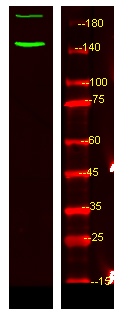c-Abl (Phospho Tyr89) rabbit pAb
- Catalog No.:YP1283
- Applications:WB
- Reactivity:Human;Rat;Mouse;
- Target:
- ABL1
- Fields:
- >>ErbB signaling pathway;>>Ras signaling pathway;>>Cell cycle;>>Axon guidance;>>Neurotrophin signaling pathway;>>Pathogenic Escherichia coli infection;>>Pathways in cancer;>>MicroRNAs in cancer;>>Chemical carcinogenesis - reactive oxygen species;>>Chronic myeloid leukemia;>>Viral myocarditis
- Gene Name:
- ABL1 ABL JTK7
- Protein Name:
- c-Abl (Tyr89)
- Human Gene Id:
- 25
- Human Swiss Prot No:
- P00519
- Mouse Gene Id:
- 11350
- Mouse Swiss Prot No:
- P00520
- Immunogen:
- Synthesized phosho peptide around human c-Abl (Tyr89)
- Specificity:
- This antibody detects endogenous levels of Human c-Abl (phospho-Tyr89)
- Formulation:
- Liquid in PBS containing 50% glycerol, 0.5% BSA and 0.02% sodium azide.
- Source:
- Polyclonal, Rabbit,IgG
- Dilution:
- WB 1:1000-2000
- Purification:
- The antibody was affinity-purified from rabbit serum by affinity-chromatography using specific immunogen.
- Concentration:
- 1 mg/ml
- Storage Stability:
- -15°C to -25°C/1 year(Do not lower than -25°C)
- Other Name:
- Tyrosine-protein kinase ABL1 (EC 2.7.10.2) (Abelson murine leukemia viral oncogene homolog 1) (Abelson tyrosine-protein kinase 1) (Proto-oncogene c-Abl) (p150)
- Observed Band(KD):
- 140(200kd BCR-ABL complex)
- Background:
- This gene is a protooncogene that encodes a protein tyrosine kinase involved in a variety of cellular processes, including cell division, adhesion, differentiation, and response to stress. The activity of the protein is negatively regulated by its SH3 domain, whereby deletion of the region encoding this domain results in an oncogene. The ubiquitously expressed protein has DNA-binding activity that is regulated by CDC2-mediated phosphorylation, suggesting a cell cycle function. This gene has been found fused to a variety of translocation partner genes in various leukemias, most notably the t(9;22) translocation that results in a fusion with the 5' end of the breakpoint cluster region gene (BCR; MIM:151410). Alternative splicing of this gene results in two transcript variants, which contain alternative first exons that are spliced to the remaining common exons. [pr
- Function:
- catalytic activity:ATP + a [protein]-L-tyrosine = ADP + a [protein]-L-tyrosine phosphate.,cofactor:Magnesium or manganese.,disease:A chromosomal aberration involving ABL1 is a cause of chronic myeloid leukemia (CML) [MIM:608232]. Translocation t(9;22)(q34;q11) with BCR. The translocation produces a BCR-ABL found also in acute myeloid leukemia (AML) and acute lymphoblastic leukemia (ALL).,enzyme regulation:Stabilized in the inactive form by an association between the SH3 domain and the SH2-TK linker region, interactions of the amino-terminal cap, and contributions from an amino-terminal myristoyl group and phospholipids. Activated by autophosphorylation as well as by SRC-family kinase-mediated phosphorylation. Activated by RIN1 binding to the SH2 and SH3 domains. Inhibited by imatinib mesylate (Gleevec) which is used for the treatment of chronic myeloid leukemia (CML).,function:Regulates
- Subcellular Location:
- Cytoplasm, cytoskeleton. Nucleus. Mitochondrion . Shuttles between the nucleus and cytoplasm depending on environmental signals. Sequestered into the cytoplasm through interaction with 14-3-3 proteins. Localizes to mitochondria in response to oxidative stress (By similarity). .; [Isoform IB]: Nucleus membrane; Lipid-anchor. The myristoylated c-ABL protein is reported to be nuclear.
- Expression:
- Widely expressed.
- June 19-2018
- WESTERN IMMUNOBLOTTING PROTOCOL
- June 19-2018
- IMMUNOHISTOCHEMISTRY-PARAFFIN PROTOCOL
- June 19-2018
- IMMUNOFLUORESCENCE PROTOCOL
- September 08-2020
- FLOW-CYTOMEYRT-PROTOCOL
- May 20-2022
- Cell-Based ELISA│解您多样本WB检测之困扰
- July 13-2018
- CELL-BASED-ELISA-PROTOCOL-FOR-ACETYL-PROTEIN
- July 13-2018
- CELL-BASED-ELISA-PROTOCOL-FOR-PHOSPHO-PROTEIN
- July 13-2018
- Antibody-FAQs
- Products Images

- Western Blot analysis of Hela treated or untreated by LPS lysis, using primary antibody at 1:1000 dilution. Secondary antibody(catalog#:RS23920) was diluted at 1:10000



